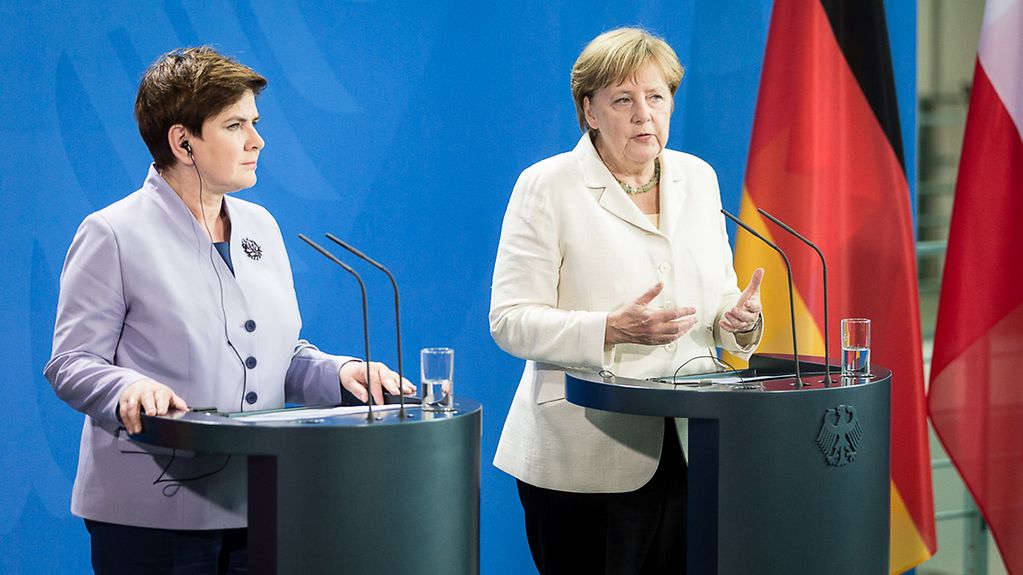German-Polish consultations
Efforts to address the root causes of migration and refugee movements, and more youth exchanges – these are examples of common action on the part of Germany and Poland. Chancellor Angela Merkel spoke of "broad, very close and cordial cooperation". In the run-up to the NATO summit in July, security-policy issues were also on the agenda.
3 min reading time

The Chancellor is happy that German-Polish youth exchanges have been stepped up
Photo: Bundesregierung/Denzel
The encounter also reflected the 25th anniversary of the signing of the German-Polish Treaty on Good-Neighbourliness. "It is by no means self-evident that Germany and Poland can today cooperate so well as neighbours," said Chancellor Angela Merkel after her meeting with Polish Prime Minister Beata Szydło at the Federal Chancellery.
"I think we have been able to speak today in a very constructive atmosphere, and a friendly atmosphere," said the Chancellor, summing up the consultations between the two governments. That is why, she continued, she believes "that today is a good day for German-Polish relations".
Projects for the past and for the future
In this context the Chancellor described the presentation of a joint German-Polish history book by the two foreign ministers as "very moving". "This shows that even looking back on what has been an extremely complex history, in which Germany bears a great deal of guilt, we are endeavouring to foster understanding and looking to the future."
As a starting point for close cooperation in future, Angela Merkel presented a joint project of the two countries’ development ministers to build a school for refugee children in Lebanon. This project was agreed during the Polish Prime Minister’s inaugural visit to Berlin. It will help tackle the root causes of displacement and is part of the European response to the refugee crisis.
Youth exchanges between Germany and Poland are also to be stepped up. Angela Merkel saw the increase in Poland’s contribution as "a very good sign that Poland is interested in working more closely for the future". On the German side, language teaching for Poles living in Germany is to be stepped up in the individual federal states.
Shared challenges
One of the greatest challenges facing both countries, said the Chancellor, is this week’s referendum in the UK on continued EU membership. Both leaders expressed the hope that the people of the United Kingdom would vote to remain in the European Union.
Another issue which was "very intensively" discussed, according to Angela Merkel, was the NATO summit, which is to be held on 6 and 7 July in Warsaw. The preparations of the foreign and defence ministers, she said have been "a very strong common effort".
Wide spectrum of issues on the agenda
Parallel to the meeting of the two heads of government, the Polish cabinet ministers accompanying the Prime Minister met with their German counterparts. They discussed matters of economic and transport cooperation, as well as the cultural and education sectors. Federal Economics Minister Sigmar Gabriel and Poland’s Deputy Prime Minister and Development Minister, Mateusz Morawiecki, signed a declaration relating to bilateral cooperation in the fields of research, development and innovation. It is to provide a basis for future joint tendering for bilateral research and development projects.
This is a field in which "there are many projects, but there is still a lot to do, in order to bring the people in our countries closer together," said the Chancellor, with a view to rail transport and the navigability of the River Oder. There is a desire, she said, to tackle these forward-looking projects step by step.
The government consultations were a "full-format" event, with all German federal ministries and their Polish opposite numbers represented, either at ministerial level or at state secretary level. The Federal Government Commissioner for Culture and the Media Monika Grütters, and the Coordinator of German-Polish Civil Society and Border Region Cooperation, Brandenburg’s State Premier Dietmar Woidke, also attended. Next year’s consultations will be held in Warsaw.
25 years of neighbourly cooperation
This year’s German-Polish consultations were held only days after the 25th anniversary of the signing of the German-Polish Treaty on Good-Neighbourliness and Friendly Cooperation. The Treaty was signed in Bonn on 17 June 1991 in the presence of the Chancellor of the day, Helmut Kohl, and his Polish counterpart, Krysztof Bielecki.
Last weekend Federal President Joachim Gauck and Poland’s President Andrzej Duda marked the event by visiting one another in Warsaw and in Berlin. During his visit to Berlin Andrzej Duda also met with Chancellor Angela Merkel.